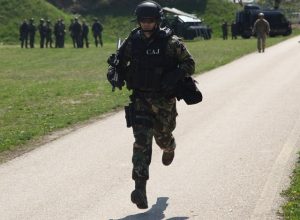Faced with a global surge in terrorism that has included radical Islamist elements in the Balkans, most countries in the Balkan region have visibly improved counter-terrorism policies, but some still have difficulties with lack of capacities, experience, and resources, a US State Department report said according to balkaninsight.com.
The State Department’s 2016 terrorism country reports, released on Wednesday, named Turkey as a source and transit country for foreign terrorist fighters wishing to join Islamic State, IS, and other terrorist groups fighting in Syria and Iraq.
It notes that Turkey suffered nine known terrorist attacks in 2016 while Turkish counterterrorism raids led to the death or capture of key jihadist operatives, including the head of an IS cell in Gaziantep province, who directed the Suruc (Sanliurfa) and Ankara railway station attacks in 2015.
However, the report says that despite being active in countering jihadist terrorism both on its territory and in Syria, Turkish anti-terrorism legislation has also been used to target government opponents, journalists, and activists.
In Albania, the report highlights its strong support for counterterrorism efforts in 2016. It has continued to participate in the US-led Global Coalition to Defeat ISIS, making significant donations of weapons and ammunition.
On November 4 and 5, a coordinated regional counterterrorism operation led to the arrests of four individuals in Albania who allegedly planned an attack on the Albania-Israel World Cup qualifying soccer match, scheduled to take place in Shkoder on November 12.
The individuals were charged with supporting IS financially and logistically, recruiting people on behalf of IS, and promoting hate speech.
Despite this progress, corruption combined with a poorly functioning judicial system continue to hinder Albania’s law enforcement efforts at all levels and might also hinder its counterterrorism activities, the report warns.
In Bosnia and Herzegovina, violent Islamist extremist ideologies and regional nationalist extremist groups both remained potential sources of violent extremism in the country, the US State Department notes.
A number of Bosnian citizens have traveled to Syria and Iraq to support IS and other terrorist groups, but sustained efforts to prevent violent extremism were credited with having reduced the flow of foreign terrorist fighters compared to previous years.
Bosnia’s officials and media sources have estimated that about 300 BiH citizens have left for destinations in Iraq and Syria since 2013, about 50 of whom have since returned, the report notes.
The report says Bosnian authorities have kept close track of foreign fighters and terrorism suspects, but the Terrorism Task Force led by the State Prosecutor’s Office has continued to falter, especially when it comes to coordination between BiH’s many security and police agencies.
In Bulgaria, the government continued to extradite suspected foreign terrorist fighters and launched a trial against three alleged Syrian foreign terrorist fighters as well as two suspected accomplices in the 2012 Burgas bus bombing, the US State Department said.
Bulgaria is also a member of the Global Coalition to Defeat ISIS and has repeatedly responded to requests for assistance, including providing weapons and munitions to the Iraqi Kurdish fighters allied to the US.
In Kosovo, the reports stresses that the threat of violent Islamist extremism has grown, assisted in part by funding from foreign organizations that preach extremist ideologies and violent extremist groups using social media to spread propaganda and recruit followers.
About 315 foreign terrorist fighters from Kosovo have traveled to Syria and Iraq to fight for IS or for the al‑Nusrah Front, Al Qaeda’s Syrian affiliate. About 58 have been killed, the report reads.
The State Department said that Kosovo has made progress in prosecuting terrorism suspects, however. Trials are ongoing for several of the 59 suspects arrested in August 2014 during the government’s largest counterterrorism operation to date; investigations are also ongoing against a dozen other individuals, including several imams, while 32 individuals have been arrested on terrorism-related charges, including 18 in November.
Macedonia conducted three significant counterterrorism operations in 2016, one of which was in coordination with authorities in Albania and Kosovo, leading to the arrest of 23 people in Albania, Kosovo, and Macedonia.
The country cooperates with US counterterrorism efforts, demonstrating its strong commitment to the Global Coalition to Defeat ISIS, the State Department report notes.
The government approved a National Counterterrorism Strategy in March, but the government has not conducted any official study on the drivers of violent extremism in Macedonia.
Analytica, a local think tank, published a report in October showing that the drivers in Macedonia encompass similar factors as those driving global extremism, to a degree compounded by the real and perceived marginalization of the ethnic Albanian community in Macedonia.
In Serbia, transnational terrorism concerns were similar to those facing other Western Balkan states located along the historic transit route between the Middle East and Western Europe – the so-called “Balkan Route” that moves weapons, narcotics, and people, the report reads.
It notes that the migrant crisis exposed numerous vulnerabilities in Serbia’s border security, which largely matched vulnerabilities in neighbouring countries. In response to the migrant crisis, Serbia has updated its screening tools and border security with help from international partners, but the reports points out that significant gaps remain in vetting and in processing data.



